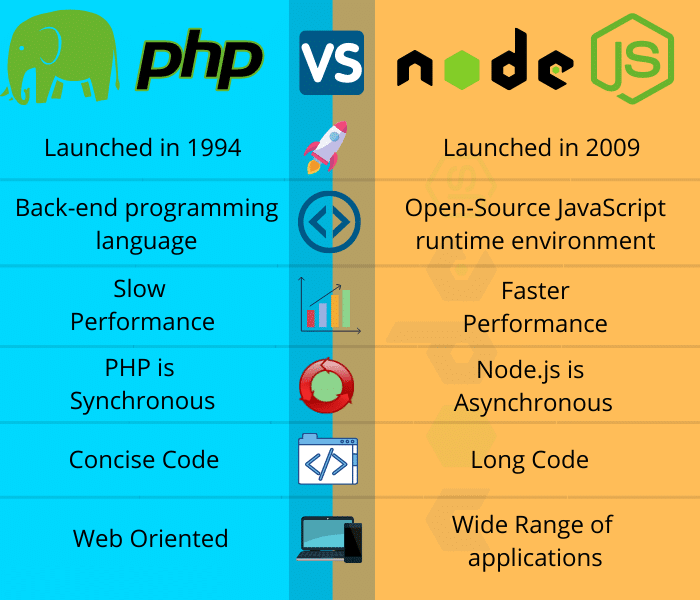Web development has evolved rapidly, with backend technology playing a critical role in delivering fast, reliable applications. Today, we’ll compare two popular backend solutions: PHP and Node.js. Each has unique strengths, which can make it challenging to determine the best fit for your project. In this guide, we’ll explore their features, performance, use cases, and more, to help you choose the right technology for your development needs.
Introduction to PHP and Node.js
PHP and Node.js are popular for web development, particularly on the server side. PHP, established in the mid-90s, has powered countless websites and remains a foundational language in web development. It’s widely known for its compatibility with various content management systems (CMS), including WordPress, Joomla, and Drupal, and for its ability to interact seamlessly with MySQL databases.
Node.js, on the other hand, emerged as a JavaScript runtime in 2009. It took the development world by storm, as it enabled JavaScript to run on the server side. Built on Google Chrome’s V8 engine, Node.js is non-blocking and event-driven, making it highly efficient for applications requiring real-time data updates, such as messaging apps or live dashboards.
Core Differences Between PHP and Node.js
-
Language
PHP is a server-side scripting language, while Node.js is a runtime environment that allows JavaScript to be executed server-side. This fundamental difference affects how each interacts with the server and handles tasks. -
Concurrency and Asynchronous Processing
PHP follows a synchronous processing model, meaning each request is processed one after the other. Node.js uses an asynchronous model, handling multiple requests simultaneously without waiting for the previous one to complete. This feature makes Node.js a great fit for applications that handle numerous real-time requests, like chat apps. -
Database Compatibility
PHP traditionally pairs well with MySQL, but it’s compatible with various databases, including PostgreSQL and Oracle. Node.js, while also versatile, is particularly effective with NoSQL databases like MongoDB, making it an ideal choice for modern, data-driven applications.
Performance Comparison: PHP and Node.js
Speed and Efficiency
PHP has evolved significantly in terms of speed, especially with the introduction of PHP 7 and PHP 8, which brought performance improvements and faster execution. However, since PHP is synchronous, complex applications requiring high-speed data exchange can experience slower response times compared to Node.js.
Node.js benefits from its non-blocking, event-driven architecture, enabling faster data handling. It’s ideal for high-load applications and scales well, as it can handle thousands of simultaneous connections. Applications with heavy I/O operations or real-time data processing will generally perform better with Node.js.
Memory Usage
Node.js tends to use memory more efficiently, as its non-blocking architecture doesn’t require multiple threads for each request. PHP, while resource-intensive, has improved memory management with newer versions.
Security in PHP and Node.js
Both PHP and Node.js are secure when used correctly, but each has its own vulnerabilities and mitigation techniques.
PHP Security
PHP has faced security challenges in the past, mainly due to its age and extensive use in web applications. However, PHP now includes several built-in functions for secure coding practices, and PHP 8 has added further improvements. Nonetheless, common vulnerabilities, such as SQL injection, require vigilant coding practices.
Node.js Security
Node.js offers built-in security features, though its ecosystem of third-party packages can introduce vulnerabilities. Regular updates and selecting reputable modules can mitigate many risks. Node.js developers also have tools like Helmet.js and the OWASP Dependency-Check plugin to identify and reduce security risks.
Development Environment and Community Support
PHP is well-supported across shared hosting environments and is easy to set up with minimal configuration. Node.js requires a bit more setup, especially for shared hosting environments, but cloud providers have made deploying Node.js apps easier.
Community and Libraries
Both PHP and Node.js have active developer communities and a vast array of libraries. PHP has a long-standing reputation and is widely documented, while Node.js benefits from a rapid innovation cycle and numerous JavaScript libraries available through npm (Node Package Manager).
When to Use PHP or Node.js
Ideal Use Cases for PHP
- Content-Driven Websites: PHP is particularly well-suited for CMS-powered websites, such as blogs or news sites.
- eCommerce Platforms: Applications like WooCommerce and Magento are built on PHP, making it a strong contender for online stores.
- Server-Side Applications with Minimal Client Interaction: PHP’s synchronous approach works well for applications where server response time isn’t mission-critical.
Ideal Use Cases for Node.js
- Real-Time Applications: Node.js excels in scenarios requiring instant data updates, such as chat applications, online gaming, and collaborative tools.
- Microservices Architecture: Its lightweight, fast response model works well for microservices, particularly those involving heavy data interactions.
- Single-Page Applications (SPA): For SPAs, which require fast loading times and dynamic data, Node.js is a strong choice due to its asynchronous, event-driven nature.
PHP and Node.js in Action: Practical Scenarios
-
Ecommerce Platforms
PHP is widely used in eCommerce websites that require integration with CMS or manage large catalogs. Node.js, however, can be better suited for real-time order tracking or inventory management. -
Social Media or Messaging Platforms
Node.js’s asynchronous capabilities make it ideal for applications where users need instant updates, like notifications or messages. PHP can handle these tasks but may struggle with high-volume, real-time data exchanges. -
Data-Intensive Applications
Applications handling massive datasets benefit from Node.js’s compatibility with NoSQL databases, enabling faster, more efficient data management. -
Blog or Portfolio Websites
PHP’s compatibility with MySQL and content-focused CMS platforms makes it the clear choice for blogs and portfolios. It simplifies the backend, and such projects do not typically require the speed and real-time functionality of Node.js.
Choosing the Right Technology for Your Project
Your choice between PHP and Node.js largely depends on your application’s specific needs, scalability requirements, and existing infrastructure. Here’s a quick guide to help with decision-making:
- Go for PHP if: You are building a content-heavy website, need CMS integration, or are working with a fixed hosting budget.
- Choose Node.js if: Your application requires real-time interactions, expects heavy data traffic, or is built with a microservices architecture.
Both PHP and Node.js offer substantial benefits, and many businesses even use a combination to achieve the best of both worlds.
Conclusion
In the debate of PHP vs Node.js, there’s no one-size-fits-all answer. PHP’s reliability, ease of use, and mature ecosystem make it ideal for content-rich sites, while Node.js’s speed, efficiency, and event-driven nature are perfect for data-intensive applications. By understanding the unique strengths and potential limitations of each, developers can make informed decisions that align with their project goals, helping them build scalable, high-performing applications that engage users effectively.




